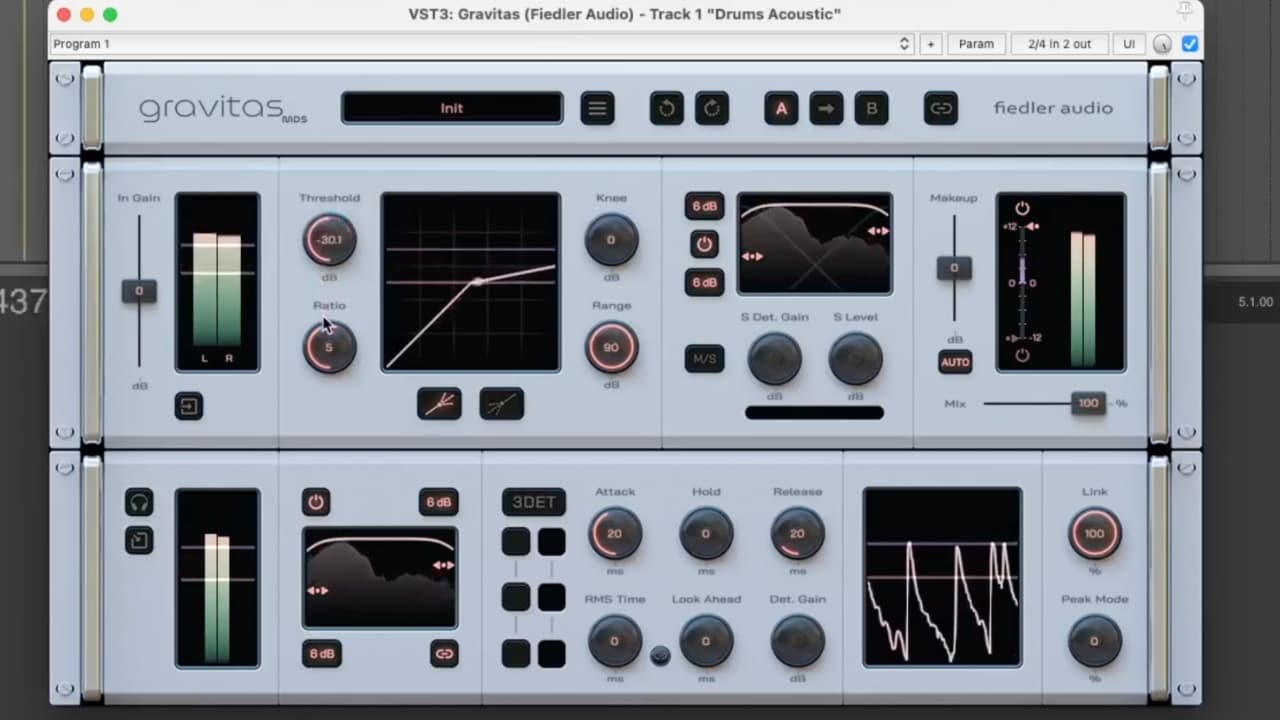
Fiedler Audio’s Dolby Atmos Composer ecosystem offers an impressively complete solution for Dolby Atmos workflows that will tempt people even if their DAW already has decent support.
Even if your DAW has decent support for Dolby Atmos workflows, Fiedler Audio’s Dolby Atmos Composer ecosystem offers a more complete solution supporting 3D aware reverb with its Spacelab plugin and 64-channel capable master dynamics with their new compressor/expander plugin gravitas MDS, which can be run as an ordinary plugin or a module to the Dolby Atmos Composer.
The Dolby Atmos Composer, together with Spacelab and gravitas MDS (Mastering Dynamics System), is a godsend for those DAWs that don’t support Dolby Atmos well. The non-Ultimate version of Pro Tools, for example, can only be used on a Mac with Dolby’s own workaround that only supports 64 channels. Fiedler’s solution, on the other hand, works with the full 128 channels afforded by the Dolby standard. Dolby Atmos Composer also turns Ableton Live, Bitwig, MOTU Digital Performer, FL Studio, Reaper, Reason, and others into fully supported Dolby Atmos workflow DAWs.
And all you need to do to make it happen is place the Dolby Atmos Composer on the master channel and insert a Dolby Atmos Beam plugin on the individual tracks you want to include in your Dolby Atmos project. The Beam plugins ensure the tracks’ audio bypasses the DAW’s mixer functions and are routed to the master track Composer along with 3D panning information that you set up in the Beam.
How it works

The Composer plugin can accommodate speaker layouts up to 9.1.6, allows users to export their mixes as ADM files, and also offers useful tools such as built‑in down-mix and trim options and fully integrated loudness measurement. The gravitas MDS plugin can use Dolby Atmos Composer’s module system to deliver master dynamics. The Spacelab reverb plugin has its own Beam plugins that from version 1.5 onwards will connect directly to the Dolby Atmos Composer from anywhere in a session.
Beams can be Composites, which is Fiedler’s name for Dolby ‘beds’. Beds are conventional channel-based premixes or stems that include multichannel panning and do not need dedicated panning via Dolby Atmos metadata. Composite Beams can be switched to being Objects, which are discrete audio elements that can be placed anywhere in the three-dimensional sound field. Objects can consist of mono or stereo content and are positioned via a Beam’s 3D object panner. You can also change from bed to object and vice versa in the Composer plugin itself.
The Composer has a Monitoring section with a personalised HRTF (head-related transfer function aka anatomical transfer function) if you have one. You can select an audio device with a multi-channel speaker layout even if your DAW lacks native support for such speaker layouts. If you don’t have a multi-channel speaker subsystem, e.g. because that can quickly run into the tens of thousands of Euros, the Dolby Atmos Composer has you covered with support for Binaural mode on headphones. This, by the way, is also how I tested the whole system.
The gravitas MDS plugin is also a Dolby Atmos Composer module
In Fiedler Audio’s Dolby Atmos ecosystem, when the gravitas MDS plugin loads as a module it is the keystone that will operate on a master Dolby level allowing for compression that takes into account all spatial information from the Dolby Atmos mix or any imported Dolby Atmos ADM/BWF file. That makes gravitas MDS the world’s first dynamics processor dedicated to tackling mix bus compression and mastering for Dolby Atmos.
In and from itself, gravitas MDS is a sophisticated plugin with an extensive parameter set that allows you to compress and expand your sound above and below the threshold in one single processing circuit instead of having several processors serially treating your signal.
When used outside of the Dolby Atmos system, the plugin offers everything from Mid/Side capabilities to level detection control, channel linking, etc. It has AMEK mastering compressor functionality, parameter linking across instances on your DAW’s tracks, and more.
When used as a module in the Dolby Atmos Composer, some interface elements change, offering access to functionality that makes sense for Dolby Atmos mastering.
It’s not the easiest of plugins to work with, and a thorough understanding of dynamic compressing/expanding is required. When done right, though, the results are perfect clarity and any desired amount of punch, while the dynamic range can be shaped exactly the way you want.

Fiedler Audio’s Spacelab Interstellar, the algorithmic reverb plugin developed by the experts at Fraunhofer IIS, has an incorporated 3D panner that can create accurate room reverbs, including very long tail reverbs that still sound realistic. It comes with spectral and spatial sculpting of the reverb tail with a spatial EQ reverb time separately adjustable on nine frequency bands. On its own it supports up to 256 inputs (objects) and outputs (speakers).
When used with Dolby Atmos Composer, you’ll simply add a Spacelab Beam to a track and in Composer you can then open Spacelab, turn the individual Spacelab beams in Objects, and more.
gravitas MDS verdict
The gravitas MDS module and the Spacelab plugin work together in Dolby Atmos Composer to deliver what I think is one of the best Dolby Atmos workflow management systems out there. Not only does this ecosystem ensure the best possible quality with all spatial information included in the mix, but it also enables you to use DAWs that have none or partial support for the Dolby Atmos workflow.
As “normal” master plugin, gravitas MDS is one of the best plugins you can buy for track-based and master bus dynamics — as is Spacelab Interstellar for reverb.
Fiedler Audio gravitas MDS (€299), Spacelab Interstellar (€399), and Dolby Atmos Composer (€249) are available online. There’s also a Spacelab Ignition reverb (€249) that supports fewer channels than Interstellar and there’s a stripped down Dolby Atmos Composer available for free.
Tags: Audio


Comments